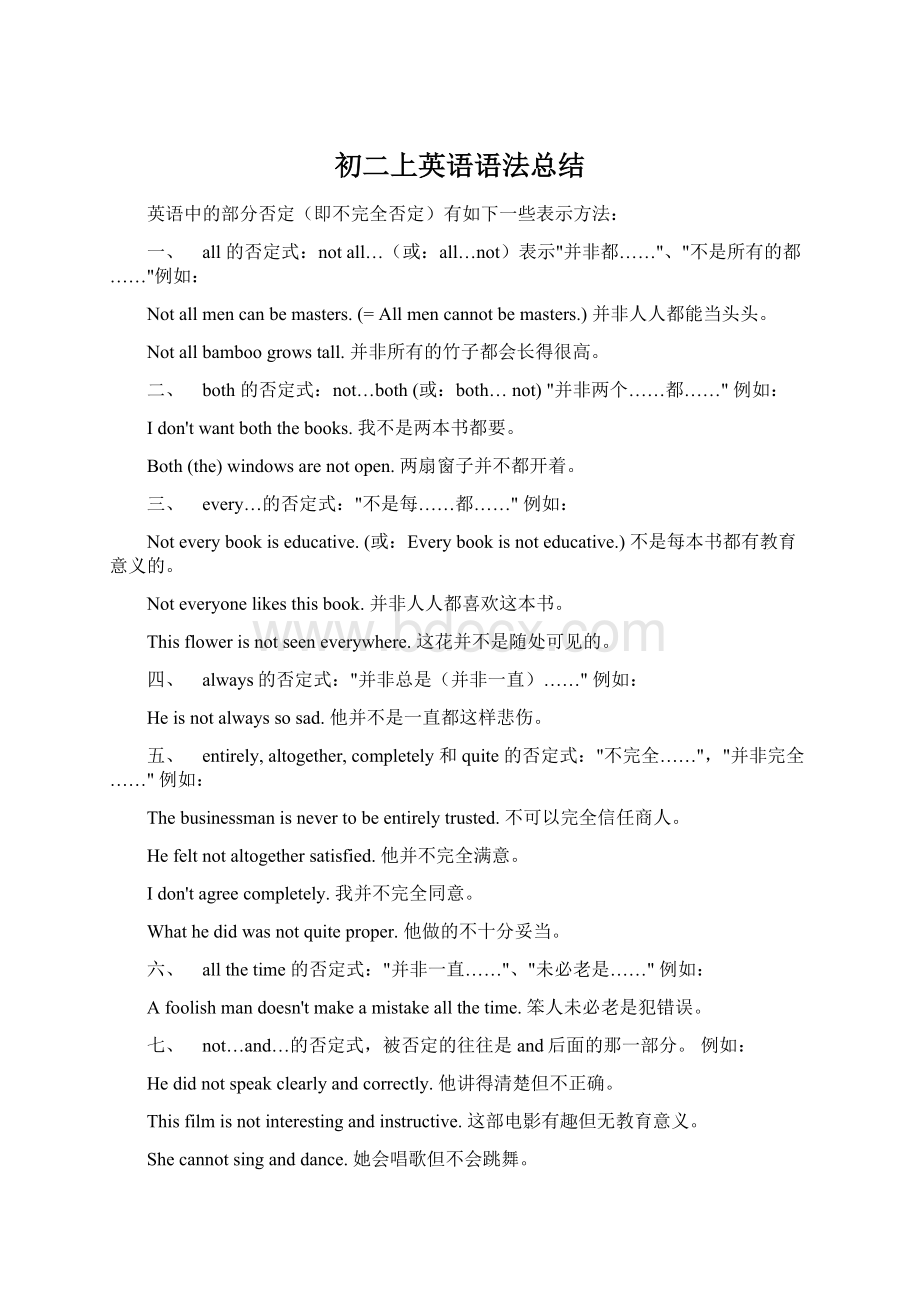初二上英语语法总结.docx
《初二上英语语法总结.docx》由会员分享,可在线阅读,更多相关《初二上英语语法总结.docx(21页珍藏版)》请在冰豆网上搜索。

初二上英语语法总结
英语中的部分否定(即不完全否定)有如下一些表示方法:
一、 all的否定式:
notall…(或:
all…not)表示"并非都……"、"不是所有的都……"例如:
Notallmencanbemasters.(=Allmencannotbemasters.)并非人人都能当头头。
Notallbamboogrowstall.并非所有的竹子都会长得很高。
二、 both的否定式:
not…both(或:
both…not)"并非两个……都……"例如:
Idon'twantboththebooks.我不是两本书都要。
Both(the)windowsarenotopen.两扇窗子并不都开着。
三、 every…的否定式:
"不是每……都……"例如:
Noteverybookiseducative.(或:
Everybookisnoteducative.)不是每本书都有教育意义的。
Noteveryonelikesthisbook.并非人人都喜欢这本书。
Thisflowerisnotseeneverywhere.这花并不是随处可见的。
四、 always的否定式:
"并非总是(并非一直)……"例如:
Heisnotalwayssosad.他并不是一直都这样悲伤。
五、 entirely,altogether,completely和quite的否定式:
"不完全……","并非完全……"例如:
Thebusinessmanisnevertobeentirelytrusted.不可以完全信任商人。
Hefeltnotaltogethersatisfied.他并不完全满意。
Idon'tagreecompletely.我并不完全同意。
Whathedidwasnotquiteproper.他做的不十分妥当。
六、 allthetime的否定式:
"并非一直……"、"未必老是……"例如:
Afoolishmandoesn'tmakeamistakeallthetime.笨人未必老是犯错误。
七、 not…and…的否定式,被否定的往往是and后面的那一部分。
例如:
Hedidnotspeakclearlyandcorrectly.他讲得清楚但不正确。
Thisfilmisnotinterestingandinstructive.这部电影有趣但无教育意义。
Shecannotsinganddance.她会唱歌但不会跳舞。
如果将and换成or,not对其后面的两部分就全盘否定了。
Hedidnotspeakclearlyorcorrectly.他讲的既不清楚也不正确。
如要对上述的all,both,every,always,以及entirely,altogether,completely,quite和allthetime等词作完全否定,那就分别要用与之相对应的全否定词,如no,none,neither,noone,never,not(never)…atall等。
例如:
Allofthemcandoit.---Noneofthemcandoit.
Botharegood.---Neitherisgood.
Everybodylikesit.---Nobodylikesit.
Heisalwayslate.---Heisneverlate.
Wedon'ttrustthementirely.---Wenevertrustthematall.
Hewashereallthetime.---Hewasneverhere.
让名词"动"起来
Table,ice,duck,flag...这些简单的英语单词,它们的名词意义就算对初学英语者来说也一定是小菜一碟,但老外经常把它们当做动词用,它们的动词意义和用法你知道吗?
1. table:
名词,桌子;当动词用,是指开会时延期讨论提案等,也就是暂缓审议。
(topostponediscussionofabillorsuggestionuntilfuturetime);例如:
Theytabledthemotionatthemeeting.
Imadethemotionandhesecondedit.(我提案,他同意。
)(second这里是动词,意思是赞成;tosecondthemotion也就是附议)
Wearetablingthismatteruntilfurthernotice.(我们延期讨论这件事,以后再说。
)
2. pride:
名词,荣誉;当动词用,是指感到得意或自豪。
(totakeprideinsomething)例如:
Wepridedourselvesonourgoodwork.(我们为自己工作的表现而自豪。
)
Ihavelongpridedmyselfonbeingagoodteacher.(我一向以身为一名称职的老师師而自豪。
)
注意:
toprideoneselfon和tobeproudof或totakepridein意思相近,只是用法和后面所跟的介词不同而已。
例如:
Theytakegreatprideinherdaughterwhoisnowafamousscientist.
IamveryproudofbeingaChinese.
3. carpet:
名词,地毯;当动词用,是覆盖的意思。
(tocoversomething)例如:
Theflowergirlscarpetedthefloorwithrosepetalsbeforethebride'sentrance.(新娘进来前,花童将玫瑰花瓣撒满了地板。
)
Duringthewintertimemyroofiscarpetedwithwhitesnow.(冬天时我家的屋顶盖满了白雪。
)
4. floor:
名词,地板;当动词用,是踩足汽车的油门,加速开车或使人惊讶。
(topressacceleratorofacartothefloorinordertospeedup;ortoastonishsomeone)例如:
AssoonasIsawhisgun,Iflooredmycar.(我一见到他有枪,立即踩足油门加速开车。
)
Whenyouseeapolicecar,don'tfloorit.(当你看到警车时,別开快车。
)
Thenewsreallyflooredme;Ihadn'tbeenexpectingitatall.(这个消息真使我吃惊地不知所措,这完全出乎我地意料。
)
5. top:
名词,顶端;做动词用,是做得更好,或高过某人。
(todosomethingbetterortobetallerthansomeone)例如:
Ifhehadtriedharder,hecouldhavetoppedhisclass.(假如他以前用功些,他会在班里(成绩)名列前茅的。
)
Thetax-cutissuewilltoptoday'sagenda.(减税问题将是今天的主要议题。
)
Mr.Lintopsmebythreeinches.(林先生比我高三吋)
6. flag:
名词,旗帜;当动词用,是指打旗号或做手势来传达讯息。
(togivesignalforcommunication)例如:
Whenmycarbrokedown,Iflaggedapolicecar.(当我的汽车抛锚的时候,我打了个信号招来一辆警车。
)
Thebeachlife-guardsusuallyflagoneanotherforcommunication.(海滨救生员通常用旗号传达讯息。
)
7. bridge:
名词,桥梁、桥牌;当动词用,是连接或沟通的意思。
(toconnect)例如:
Theparentsaretryingtobridgethegenerationgapwiththeirchildren.(父母都在设法弥合与儿女的代沟。
)
Thesetaxreformsareattempttobridgethegapbetweentherichandpoor.(这些税收改革旨在弥合贫富之间的差距。
)
8. club:
名词,俱乐部、高尔夫球棒;当动词用,意思是用棍棒打人。
(tobeatsomeonewithastick)例如:
Thesecurityofficershouldnotclubanysuspectwhodoesnotresistarrest.(保安人员对任何没有拒捕的嫌犯都不该用棍棒殴打。
)
Isawthepoliceclubbingasuspectedrobber.(我看到警察用棍棒打了那个抢劫嫌疑犯。
)
9. soldier:
名词,士兵;当动词用,是指不畏困难,坚持下去。
(toforgeaheadnomatterwhatdifficultyis)例如:
TheMarineCorpsusuallyhavetosoldieronunderthehardestconditions.(海军陆战队通常在最艰难的情況下,仍要勇敢前进。
)
Hedoesn'tlikethejobbuthe'llsolideronuntiltheycanfindareplacementforhim.(他不喜欢这个工作,但他会继续干下去,直到他们找到接替他的人为止。
)
10. duck:
名词,鸭子;当动词用,是逃避、躲避、回避的意思。
(totrytoavoid)例如:
Hisspeechwasfullofgeneralizations,andduckedalltherealissues.(他的讲话全是泛泛而谈,回避了所有实质性的问题。
)
11. chair:
名词,椅子、主席(chairperson);当动词用,是担任主席(tobeachairperson)例如:
Hehaschairedacommitteeoninternationalaffairs.(他担任国际事务委员会的主席。
)
Shewillchairthemathdepartmentnextsemester.(下学期她将担任数学系主任。
)
12. doctor:
名词,医生、大夫;当动词用,是指窜改、对……做手脚。
(tochange,esp.inadishonestway)例如:
Theywerechargewithdoctoringtheelectionresults.(他们因窜改选举结果而受到控告。
)
todoctorthenumber是做假账的意思,相当于tocookthebook,tomakesomethingfraudulentorfalse
Hetriedtodoctorthenumberbeforetaxtime.(他在报税前设法做假账。
)
13. cushion:
名词,坐垫;当动词用,是指缓和,缓和或降低对某事的撞击或震动(tosoftenordecreaseimpactofsomething)例如:
Powerfulshockabsorberscushionourlanding.(有效的减缓装置缓解了我们着陆时的冲撞力。
)
Nothingcancushionthesorrowofhermother'sdeath.(什么也不能减轻她丧母的悲痛。
)
14. cap:
名词,便帽;当动词用,是指限额、约束或制止。
(tolimitsomething)例如:
Thenewlawhascappedthecrabbingseasoninourarea.(新法令限制了该地区捕蟹的时节。
)(即不准随时捕蟹)
Ourschoolwillcapthewhitestudentenrollmenttopromoteitsdiversityprograms.(本校为了促进生源的种族多元性,对白人学生的生源加以了限制。
)
15. showcase:
名词,陈列柜;当动词用,是指展览或亮相(tohighlight)。
例如:
Shefullyshowcasedherabilityinthedebate.(她在这场辩论赛中充分展示了自己的才华。
)
Therealestatecompanyisshowcasingmanynewhousesinthenewspaper.(该房地产公司在报纸上展示了多款新房型。
)
16. grandfather:
名词,祖父;当动词用,是指保护(免受限制)或保持现状(toprotectortokeepthesamestatus)。
例如:
Ourcurrentemployeeswillbegrandfatheredundertheexistinghealthinsurance.(现有卫生医疗制度为我们的员工提供了保障。
)
Everybodywouldliketograndfatherthisregulationasitis.(大家都想要保持现有的制度。
)
Thenewstaff**cannotbegrandfatheredintotheoldpensionsystem.(新员工不能享受旧有的养老制度。
)
17. corner:
名词,角落或壁角;当动词用,是指将某人逼入困境或令人无地自容(toputsomeoneinabadspot)。
例如:
Don'ttrytocorneryourspouse.(不要让你的爱人为难。
)
Hehasbeencorneredbyhisbestfriend.(他最好的朋友却让他感到无地自容。
)
Finally,theescapedcriminalwascornered.(那名逃犯最终走投无路了。
)
18. distance:
名词,距离;当动词用,是指冷淡、疏远或与某人保持距离(tokeepyourselfadistancefromsomeone)。
例如:
Itisdifficultforhimtodistancehimselffromher.(对他来说,疏远、冷淡她是很困难的。
)
Thepoliticianswilldistancethemselvesfromthecontroversialissues.(政客们想要尽量远离有争议的问题。
)
Theparentsadvisetheirdaughtertodistanceherselffromherboyfriend.(她的父母劝告她要和男朋友保持一定距离,不可太过亲密。
)
19. book:
名词,书本;当动词用,是指预订飞机座位、机票、旅馆房间等。
此外还指警方将……登记如册以为指控之用(topresschargeagainstsomeone,generallybythepolice)。
例如:
Mr.Chenhasbooked(或made)areservationatahotel.(陈先生已经预订了旅馆房间。
)
YesterdayhebookedaflighttoTaiwan.(昨天他订购了到台湾的机票。
)
Thepolicebookedhimfordrunkendriving.(他被指控酒后驾车。
)
20. house:
名词,房屋;当动词用,是指供给住所(toprovideshelter)。
例如:
Thefarmerhashousedthehorseinthebarn.(农夫把他的马圈在马厩里。
)
Iwouldbegladtohouseyoufortheweekend.(我很高兴这个周末你能够住在我这里。
)
21. radio:
名词,收音机;当动词用,是指用无线电发送讯息,广播,发报(tosendamessage)。
例如:
Atairporttheladyradioedforamissingchild.(机场中,有一位女士正在广播寻找一个走失的孩子。
)
AllU.S.shipswillhavetoradiotheCoastGuardwhentheyareintrouble.(美国船只如果遇到困难,可以用无线电同海岸巡逻队取得联系。
)
22. dog:
名词,狗;当动词用,是指尾随某人,困扰某人或某事(tobothersomeoneorsomething)。
例如:
Hewasdoggedwhereverhewent.(他不管到哪里,总被人尾随。
)
Hercareerwasdoggedbymisfortune.(她一生屡遭不幸。
)
23. fare:
名词,票价;当动词用,是指过活、进展(togetalongortoturnout)。
例如:
Howdoyoufare?
=Howareyoudoing?
Ifareverywell.=Iamdoing(feeling)well.
Howdidyoufareinyourexam?
(考得怎样?
)
Ifaredverywellinmyexam.(我考得很好。
)
Ifhegetscaughtforshoplifting,hemayfareapunishment.(如果他因为盗窃被捕,将会受到惩罚。
)
24. father:
名词,父亲;当动词用,是指为人父(tobegetachild)。
例如:
Hehasfatheredtwochildrenbeforehisremarriage.(他再婚前已经是两个孩子的爸爸了。
)
Hopefully,Mr.Chenisgoingtofatherachildsoon.(希望陈先生很快能够当上爸爸。
)
注意:
如果以母方来说,就是:
Sheborehimtwochildren.(她为他生了两个孩子);或
Sheboreason.也就是Hebegotason.
所以"tofatherachild",也就是"tobegetachild"
表达数目和数量的特别方法
大家知道,不可数名词没有表示复数的“-s”标志,因此前面不可有数目字,只可以有数量词。
例如我们可以说①,不可以说②:
①Thereisnotmuchfurnitureintheoffice.
②Therearenotmanyfurnituresintheoffice.
这是不是说不可数名词就不可数呢?
不然。
相反的,不可数名词也是可数的,主要方法是借重单位词(unitword),如:
apieceof,acupof,adropof,alumpof,ahandfulof,aflashof,abladeof,aheadof,abarof,anearof等。
如果数目是超过“一”,就以确实数目取代“一”。
例如:
twopiecesof,threecupsof和fivelumpsof等。
现在试试把上述这类单位词和适当的不可数名词连用。
① MrLihasjustboughtapieceofnewfurniture.
② Givemeacupofcoldwater,please.
③ Pleaseputtwolumpsofsugarinmycoffee.
④ Theboypickeduptwohandfulsofsandfromthebeach.
⑤ Wesawaflashoflightninginthesky.
⑥ Thegardenerpulledoutbladesofwildgrassfromthegarden.
⑦ Shegavebarsofchocolatetothevisitingchildren.
有些名词如scissors,trousers,spectacles,tongs,pliers等,都以复数形式出现,如:
⑧ Thescissorsarelyingonthetable.
⑨ Thespectaclesfitmenicely.
如果要给这些名词表示单数“一”的意思,就要借重单位词了。
例如:
⑩ Maryhasjustboughtapairofscissors.
现代英语注重简洁,合成形容词便应运而生,其中有一种是用来表示数目的,方法是:
“数目+名词”,如:
afive-yearplan,aten-dollarnote,atwo-hourmeeting,athree-dayconference等。
必须注意的是,这种合成形容词中的名词,只能以单数形式出现。
如果用复数,就错了,如:
afive-yearsplan,aten-dollarsnote,atwo-hoursmeeting,athree-daysconference.
这类错误,虽然频率不是很高,但也是要留意才好。
如果没有把握,不妨用完整的表达方式,如:
afive-yearplan→aplanoffiveyears
aten-dollarnote→anoteoftendollars
athree-dayconference→aco